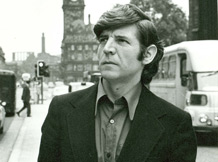
Bill Douglas in Edinburgh, in the early 1970's.
British film maker celebrated at Exeter
To mark the 20th anniversary of British film maker Bill Douglas’s untimely death in 1991 a conference is being held at the University of Exeter on 23 September.
All aspects of Bill’s film career will be discussed including The Bill Douglas Trilogy, Comrades, uncompleted works, and the vast collection of cinema related artefacts that forms the basis of the University’s museum named in his honour.
The conference is free-of-charge and is open to members of the public who register in advance by emailing bdc@exeter.ac.uk.
The Bill Douglas Centre for the History of Cinema and Popular Film (BDC) is a public museum and a research facility for scholars. From shadow puppets to Shirley Temple dolls, from magic lanterns to Marilyn Monroe postcards it holds over 70,000 artefacts related to the broad history of the moving image. The museum’s founding collection was put together by Bill Douglas and his life-long friend Peter Jewell over thirty years and was given to the University in 1994.
A film about Charlie Chaplin’s London, made in 1966, will have its first public screening at the conference. Bill Douglas and Peter Jewell made the 8mm film, which has been restored by film maker Sean Martin who will present the movie to the conference delegates. As part of the special showing of “Charlie Chaplin Lived Here” there will be live commentary by Peter Jewell. Keynote speaker Dr. Karen Lury from the University of Glasgow will speak about My Childhood, the first part of The Bill DouglasTrilogy. Dr Andrew Noble will present extracts from tapes he made just after Bill’s death with people from the film industry that worked with him.
Mr Jewell said: “The film is simply a brief record of sites associated with Chaplin’s childhood in Kennington, South London. On the day we went to film the modest house, 3 Pownall Terrace, where Chaplin grew up, a bulldozer was pulling down the row of terrace houses. We made it just in time, Bill and I climbed into number 3 and took a look around, it was a tiny garret space that Chaplin shared with his mother and brother, a place he recalls in his autobiography”
He added, “Bill identified closely with Chaplin as they shared a history of an impoverished childhood and both their mothers went into mental health hospitals, as a result Bill could relate to some of Chaplin’s experiences.”
Peter Jewell, the principal donor to the BDC, was recently inducted into the University’s College of Benefactors. Induction into the College is the highest honour that the University can bestow upon its benefactors, and Peter's induction is in recognition of his extraordinary generosity and the importance of The Bill Douglas Centre to the life of the University of Exeter.
To coincide with the anniversary a new Film Studies studentship has been created for doctoral research on the work of Bill Douglas, particularly the production of Comrades, released in 1987. Funded by the Bill Douglas and Peter Jewell Trust and the University of Exeter’s Department of English the studentship, awarded to Hannah Brown who has recently completed her MA at Exeter, will work on previously unavailable primary sources in researching the work of one of Britain's most important and influential filmmakers. Hannah will study draft scripts and production correspondence around Comrades and write a doctoral thesis using this material on the film and its production, including the context of British cinema in the 1980s. She will work closely with the curatorial team at The Bill Douglas Centre and, as part of the project, document the material so it can be accessed by other researchers. The studentship will also provide the opportunity to interview Peter Jewell and others involved in the production in order to understand Bill Douglas' distinctive working practices.
Phil Wickham, Curator of the Bill Douglas Centre said: “The film studies doctorial studentship project has the potential to produce ground-breaking research on one of Britain's greatest and most distinctive cinematic artists. The launch of this study is one of the ways in which the Centre will commemorate Bill Douglas, his life and his work. We hope that the doctoral project on Comrades will lead to further research on Bill's archive. “
Date: 20 September 2011
